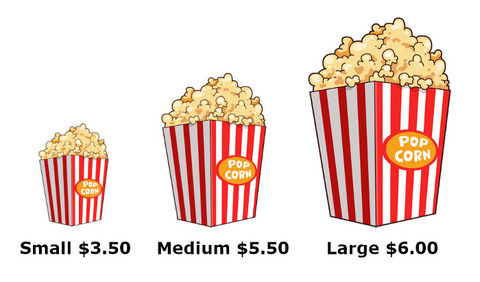Nov 21, 2022
How Web Apps Became Decoys To Get You To Install Native Apps
The web is now an irrelevant alternative and we must do better

You know that popcorn price list at the cinema where the large bucket is only slightly more expensive than the medium size one?
That medium size is only a decoy to get you to buy the large one.
If you can get a large bucket for only 50 cents extra, why would you buy the medium one?
Of course you wouldn’t. Nobody does.
It’s deliberately put there to make you buy the large one.
Take a look at the image above and imagine there was no medium option, only small and large. Which one would you pick?
Much harder to choose, right?
This is known as the Decoy Effect. It’s deliberately offering an irrelevant alternative that virtually nobody will pick, only to make a more expensive option look more attractive.
Web apps as irrelevant alternatives
Web apps are increasingly used as decoys by companies to get you to install their native app.
How?
By deliberately offering a subpar user experience that’s much worse than their native app.
By bombarding you with app install banners in their web app.
By telling you that you need the app “for the best experience”.
The message is that the web cannot offer the user experience that native apps can which, frankly, is an outdated vision.
To these companies their web app is that medium sized popcorn bucket they put next to the slightly more expensive large one to get you to buy that.
It’s like a sales funnel with their web app at the top and their native app at the end.
But why? Now that the web is more powerful than ever?
Ignorance, unwillingness and the feature gap
Historically, web apps have always been underpowered and could not offer that features that native apps did.
But the web has evolved tremendously and that feature gap is closing at a rapid pace.
It’s amazing what PWAs can now do and many, if not most native apps could now just as well be a PWA.
Not everyone is aware of this though and sadly, the prevailing image of web apps is that they’re still inferior to native apps.
Even more sad is the fact that many companies are not investigating this and don’t even seem to care about their web app.
Their web apps don’t just miss certain features but suffer from issues that can only be described as an unwillingness to improve their web app, as it’s just an irrelevant alternative to the native app: a dumbed-down trial version before you get to the “real thing”.
I’m talking about:
and I could go on for awhile…
In a way it makes sense to offer less features if you view a web app merely as a means to promote a native app, but offering a downright crappy user experience does not.
Companies are leaving money on the table
Statistics show that PWAs consistently improve user engagement, load times, bounce rates and therefore increase revenue.
A faster web app = more revenue, it’s as simple as that and companies that neglect their web app are leaving money on the table.
Even if you don’t want to go the full PWA route you should at least add a service worker to your web app which can, no, will improve its performance dramatically.
Despite this benefit, less than 6% of the top 10k web apps in the world actually use a service worker while native apps work offline by default.
We can and should do better.
But… but… iOS!
iOS is still the elephant in the PWA room and probably will be for a while.
Apple are effectively hiding the PWA revolution from iOS users by not allowing competing browser engines on their platform, but even they are making progress and won’t be able to keep this up forever.
While the lack of support of modern web features in Safari is still an issue, many are supported and can be used today.
But for certain use cases a native app may still be the better option. PWAs probably won’t replace native apps any time soon but I foresee a bright future if we stop treating web apps as dumbed-down trial versions of native apps.
Web apps are way too powerful for that.
And Progressive Web Apps are even more powerful: